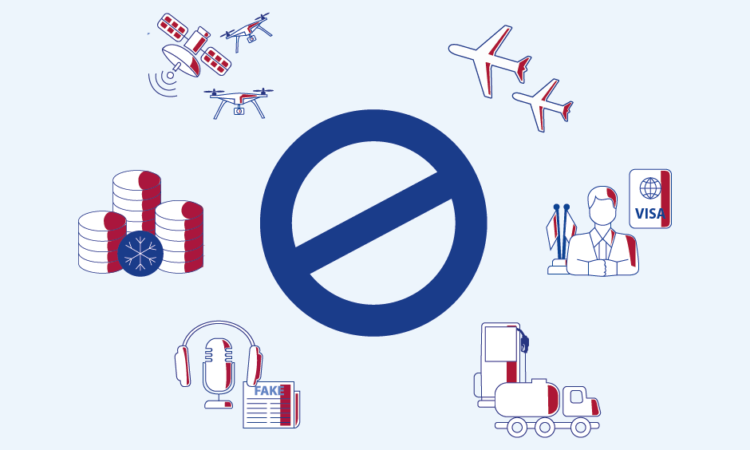
Russia uses all of these outlets to intentionally spread propaganda and conduct disinformation campaigns, including about its military aggression against Ukraine.
They cover all means of transmission and distribution in or directed at EU member states, including cable, satellite, Internet Protocol TV, platforms, websites and apps.
In line with the Charter of Fundamental Rights, these measures will not prevent those media outlets and their staff from carrying out activities in the EU that do not involve broadcasting, e.g. research and interviews.
The EU has also imposed sanctions on media organisations and individuals responsible for propaganda and disinformation.
What is the EU doing to prevent the circumvention of sanctions?
Faced with the scale of the EU’s sanctions, Russian targets have deployed various techniques to circumvent them, such as using complex financial schemes, falsifying the nature or origin of the goods traded or relying on the jurisdictions of third countries.
Listed persons and entities have also made efforts to conceal their assets.
The EU has taken several measures to avoid and prevent circumvention, including:
- strengthening bilateral and multilateral cooperation with third countries, and providing technical assistance
- broadening the listing criteria to make it possible to target those who facilitate circumvention
- sanctioning entities which are located in third countries and which are involved in the circumvention of trade restrictions
- introducing a transit ban on dual-use goods, technologies and battlefield goods being exported from the EU to third countries via Russian territory
- introducing a ban on access to EU ports for vessels engaged in ship-to-ship transfers and suspected of breaching sanctions
The EU banned Russian nationals from owning, controlling or holding any posts on the governing bodies of legal persons, entities or bodies providing crypto-asset wallet, account or custody services to Russian persons or residents.
Additionally, notifications are now required for transfers of funds exceeding €100 000 outside the EU by any entity established in the EU that is owned or controlled by Russia.
No Russia clause
Since December 2023, there is a new clause which applies to EU exporters and contractually prohibits re-exportation to Russia and re-exportation for use in Russia of a limited number of goods, when selling, supplying, transferring or exporting to a third country, with the exception of partner countries. The clause covers prohibited:
- dual-use goods
- advanced technology items used in Russian military systems found on the battlefield in Ukraine or critical to their development
- production or use of those Russian military systems
- aviation goods and weapons
How does the EU prevent circumvention of sanctions by third countries?
In order to address the growing circumvention of EU sanctions, the EU has decided to further strengthen bilateral and multilateral cooperation with third countries and the provision of technical assistance.
Only in cases where cooperation does not yield the intended results will the EU take rapid, proportionate and targeted action, the sole aim of which will be to deprive Russia of the resources which allow it to pursue its war of aggression against Ukraine, in the form of appropriate individual measures addressing the involvement of third-country operators in facilitating circumvention.
The EU will re-engage in a constructive dialogue with the third country in question following the adoption of such individual measures. In the event that, in spite of individual sanctions and further engagement, circumvention remains substantial and systemic, the EU will have the option of taking exceptional, last-resort measures.
In this case, the Council may unanimously decide to restrict the sale, supply, transfer or export of listed goods – notably battlefield products and technologies – to third countries whose jurisdiction is demonstrated to be at continuing and particularly high risk of being used for circumvention.
In addition, the EU has required:
- EU parent companies to ensure that their third-country subsidiaries do not take part in any activities resulting in an outcome that the sanctions seek to prevent
- EU operators to implement due diligence mechanisms for selling battlefield goods to third countries
- EU operators transferring industrial know-how for the production of battlefield goods to third-country to include contractual provisions to ensure that such know-how will not be used for goods intended for Russia
In December 2022, the EU appointed David O’Sullivan as international special envoy for the implementation of EU sanctions. The special envoy’s task is to ensure continuous, high-level outreach and discussions with third countries to avoid the evasion or even circumvention of sanctions against Russia and to ensure that sensitive battlefield goods of European origin do not find their way to Russia.





